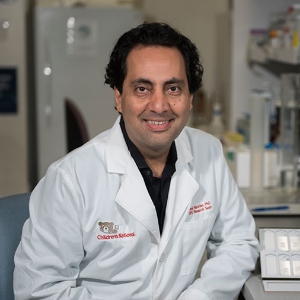Research And Grants

Children's National Health System and Children's Research Institute - $125,000
Dr. Javad Nazarian
$125,000.00
December 2015
Translational
DIPG
Comprehensive Molecular-Based Cross-Species Comparison of DIPG Biology
Comprehensive Molecular-Based Cross-Species Comparison of DIPG Biology
Scientific Merit: Despite recent advances in understanding some of the molecular mechanism of DIPG, there remains a great deal of unknown with respect to the disease pathogenesis. Mutations in histone 3 have been identified as driver mutations in up to 80% of all DIPGs. However, the exact molecular and cellular events that follow histone mutation are not well understood. Our collaborative
team of researchers have intends to use the resources of four well established DIPG laboratories to:
i) generate comprehensive molecular profiles of a large cohort of DIPG specimens,
ii) generate comprehensive cross-species comparative analysis of molecular events leading to tumorigenesis, and
iii) demonstrate the power of cross-species genomic studies for identifying and matching DIPG subgroup-specific driver mutations.
Disease Impact: Combined cross-species analysis of human DIPG specimens, DIPG primary cells and DIPG murine models. The immediate outcomes of the proposed project will be:
1. Generation of comprehensive molecular profile of a large cohort (n = 48) DIPG specimens.
2. Identification of molecular mechanism of epigenetic alterations governed by histone mutation.
3. Comprehensive cross-species comparative study of DIPG.
Our results will have immediate impact on DIPG by providing new paths for developing targeted treatments.
Innovation: Our collaborative proposal is innovative by taking advantage of the following unique opportunities:
1. A large collaborative group encompassing four established DIPG research laboratories.
2. Access to novel preliminary (proteomics, RNA profiling, exome, SNP copy number) data
supported by Collaborative.
3. Generation of new molecular data from specimens obtained through Collaborative (the research team is the first to have access to these rare biospecimens).
4. Utilization of a DIPG specific SILAC protein Atlas.
5. Incorporation of investigation into DNA structure with molecular data.
6. Comparative analysis of matched mouse and human tumors with the aim of deciphering genomic events driving DIPG.
Feasibility: PIs of the proposed project have generated preliminary data through previous Collaborative funding support. PIs have been granted access to additional specimens from Collaborative biobanks and their proposal has been approved by the Collaborative Scientific Advisory Committee. The cross-species approach is novel and provides a hypothesis driven aspect to the
proposed project.
Expertise: Dr. Nazarian (PI) at CNHS has led efforts in studying the protein profiling of DIPGs and generation of the first DIPG protein Atlas. Dr. Hawkins (Co-PI) at Hospital for Sick Children (SickKids) is an expert in pathology and studying the molecular basis of pediatric brain tumors. The Centre for Applied Genomics at SickKids is a pioneering center in generating genomic profiles of pediatric brain tumors. This center houses an Illumina HISeq 2500 platform which will be used for the proposed study. Dr. Becher (Co-PI) is a pediatric neuro-oncologist who is primarily laboratory based with expertise in the development and use of genetic mouse models of DIPG as preclinical tools
Dr. Drissi (Co-PI) has a strong background in telomere/telomerase biology and in DNA damage. He is PI on several funded studies on pediatric brain tumors.

